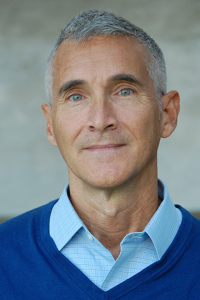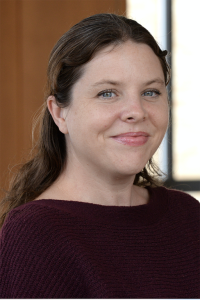
Endowed Professorships Honor the Legacies of Barbara and Bruce P. Dohrenwend
Two Columbia Mailman School faculty members were honored with endowed professorships in recognition of the late Barbara and Bruce P. Dohrenwend, married partners and influential professors in epidemiology and sociomedical sciences at the Columbia Mailman School.
A November 10 installation ceremony honored and traced the connections between the Dohrenwends and the two professors whose academic titles now bear their names. Kathleen J. Sikkema, Interim Dean of Columbia Mailman School, was installed as the Barbara and Bruce P. Dohrenwend Professor of Sociomedical Sciences. John R. Pamplin II, PhD’14, MPH’14, was installed as the Bruce P. Dohrenwend Assistant Professor of Psychiatric Epidemiology. Both received medals to mark the occasion.
The Dohrenwends conceptualized an endowed professorship prior to Barbara Dohrenwend's death in 1982. In recent years, Bruce Dohrenwend and his second wife, Catherine J. Douglass, made plans for a second endowed professorship to accompany the first. Following the passing of Bruce Dohrenwend earlier this year, Douglass expedited the process to create the two professorships. Dina Dublon, chair of the School’s Board of Advisors, and Katrina Armstrong, CEO of Columbia University Irving Medical Center, expressed their gratitude to Douglass, who founded the nonprofits Her Justice and the Lawyers Committee Against Domestic Violence while pursuing a career in corporate law. Armstrong praised Douglass’s efforts to “step up at a time of need to make this happen for our faculty,” referencing ongoing challenges to public health and higher education.
Remembering the Dohrenwends
Bruce Dohrenwend joined Columbia Mailman in 1958 and served on the faculty for over five decades, as a professor of social psychiatry in the Department of Epidemiology and as chief of the Department of Social Psychiatry at the Psychiatric Institute. He founded the National Institutes of Health-funded Psychiatric Epidemiology Training Program (PET) at Columbia in 1975 and led the program for 20 years. Beginning in the early 1960s, he and Barbara Dohrenwend collaborated on a research program that focused on the relationship between stressful life events and the development of mental illness in community settings. Bruce Dohrenwend contributed influential research teasing apart the factors that give rise to mental illness, from the social environment and stress to genetic factors. Barbara Dohrenwend served as professor and head of Sociomedical Sciences from 1979 until her death. Her research prefigured the growth of community psychology, health psychology, and psychological epidemiology.
“Bruce and Barbara were central to the development of the field that I hold dear—psychiatric epidemiology—and their work together has been immensely influential to me and others in the field,” said Katherine Keyes, PhD’10, MPH’06, professor of epidemiology and current PET director, who studied under Bruce Dohrenwend, or “Bruce D” as she and generations of faculty called him. The late epidemiologist provided more than 40 years of “mentorship, guidance and insight” to psychiatric epidemiology trainees that “shaped the careers of hundreds of scholars, including myself,” she added.
James Colgrove, PhD’14, MPH’01, a public health historian and professor and acting chair of sociomedical sciences, said, “The name Dohrenwend served as a kind of shorthand signifier for a genre of research that we considered to be the hallmark of SMS, research that critically examined the social structures that influenced physical and mental health, research that was analytically innovative, methodologically rigorous, and guided by a strong moral compass of vision of better, more just society and a commitment to equity.”
Patrick E. Shrout, professor emeritus of psychology at NYU and former professor of biostatistics at what is today Columbia Mailman School, said Barbara Dohrenwend “opened my eyes to the processes that involve social contexts.” Offering an example of the Dohrenwends’ generosity, Shrout said they published a book chapter he wrote about measuring stressful life events. “I was listed as a sole author, but in fact, I wouldn't have been able to write that without her mentoring,” he said.
Pamplin, who earned his master’s and doctoral degrees at Columbia Mailman and trained in the PET program, recalled the “rite of passage” he experienced presenting at PET seminars attended by Bruce Dohrenwend, then in his late 80s. “He wasn't there to lob a softball question for you,” Pamplin recalled. “He was there to ask the question.” The senior scientist was there “to ensure the rigor of the science that came out of this program met his standard.” Ultimately, Dohrenwend held trainees to his standard because “he believed that you could reach the standard,” Pamplin said.
Honoring Outstanding Faculty
Several speakers drew connections between the Dohrenwends and the two faculty whose endowed professorships bear their name.
In remarks about John Pamplin whose scholarly work focuses on how structural drivers like racism drive rates of mental illness and substance abuse, Charlie Branas, chair of epidemiology, said, “It feels especially fitting that an endowed chair named for Bruce, who so deeply valued supporting junior scholars, both with his mentorship and his philanthropy now, will be held by just a tremendous rising member of our faculty,” adding, “John Pamplin follows [in the tradition of Bruce Dohrenwend] very directly by standing up for what is right scientifically and in the world.”
Comparing Barbara Dohrenwend and Kathleen Sikkema, both social psychologists, Colgrove said, “Like Barbara, Kathy's impact on Sociomedical Sciences has been transformative,” adding that she has revitalized the department’s focus on community mental health and has recruited and mentored several junior faculty. Sikkema, who serves as the inaugural co-director of the Susan Lasker Brody Center for Population Mental Health, is a globally recognized scholar, researcher, and advocate who has contributed groundbreaking work on traumatic stress, coping, and gender violence, especially in low-resource settings.
Sikkema marveled at the numerous connections between her work and the Dohrenwends. Bruce Dohrenwend was a trailblazer in the study of adversity and stress and the social determinants of various psychiatric disorders, including PTSD, an area in which Sikkema works. Moreover, the Dohrenwends’ work on the integration of psychology and public health was influential to Sikkema early in her career. It is rare to have an endowed professorship named for people who are so reflective of your own scholarship, she observed, saying, “It’s truly an honor to receive this professorship in their names.”
“I only wish Bruce could be here to congratulate you both—and Barbara too,” said Catherine Douglass. “Bruce could never actually envision leaving Columbia altogether. This moment of celebration recognizes that Bruce has not left altogether. I believe he is here with you all, challenging you and cheering you on.”




